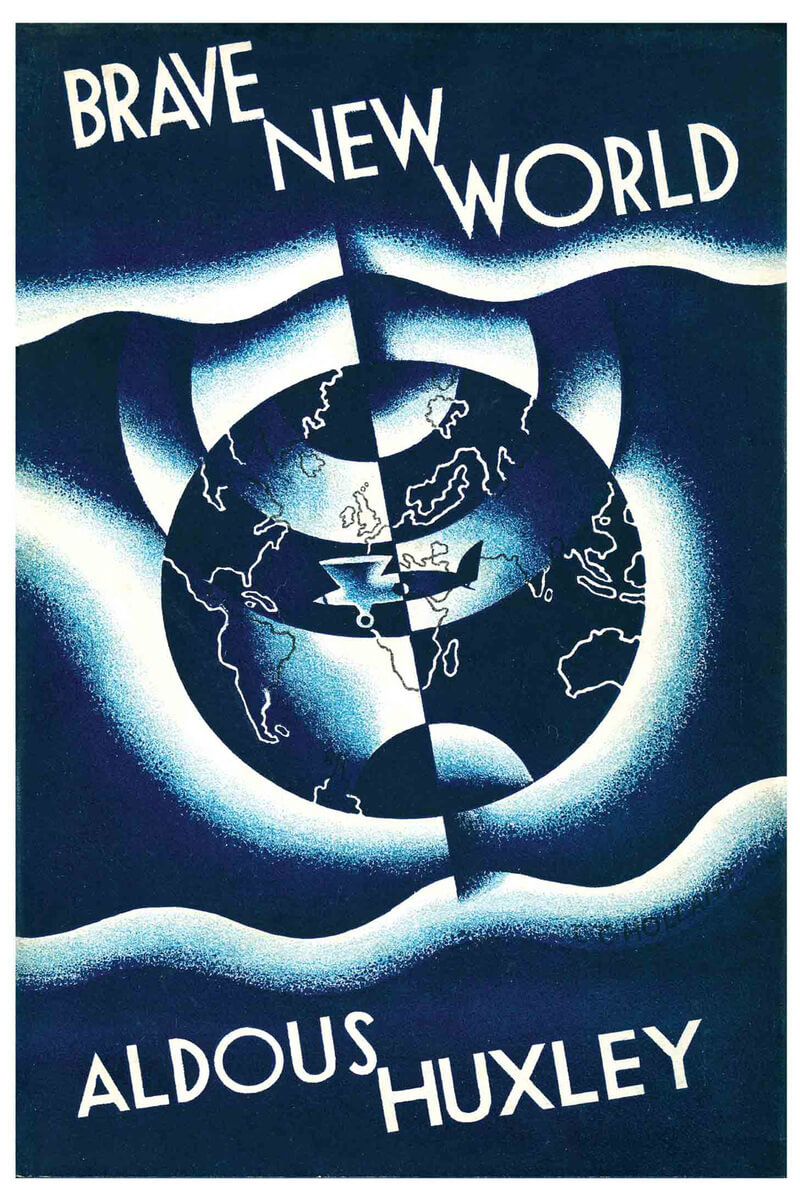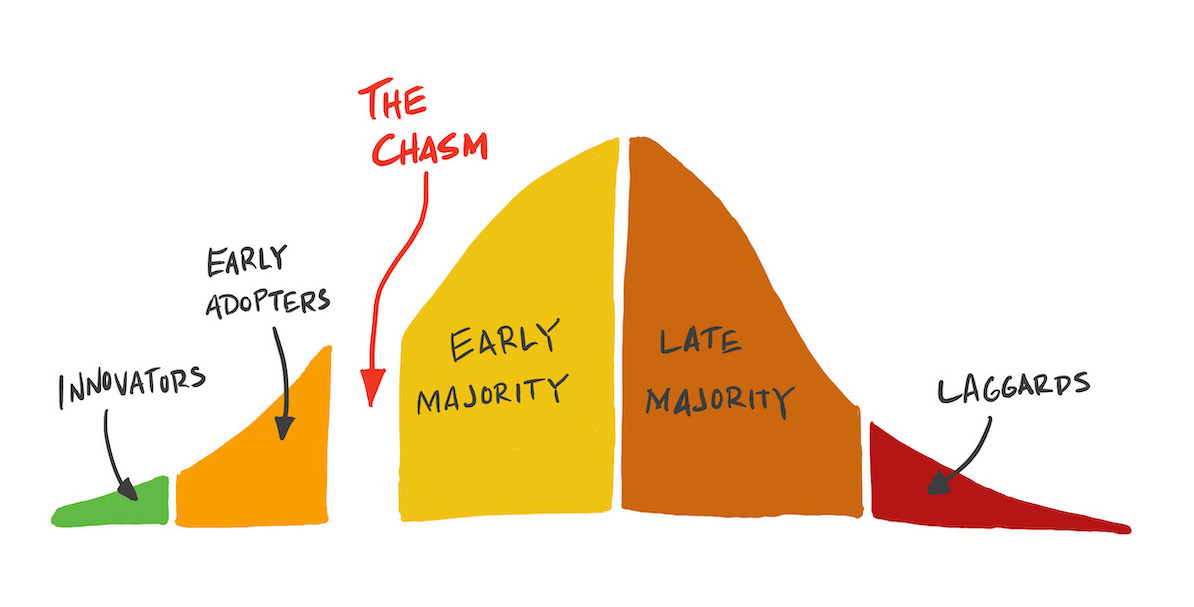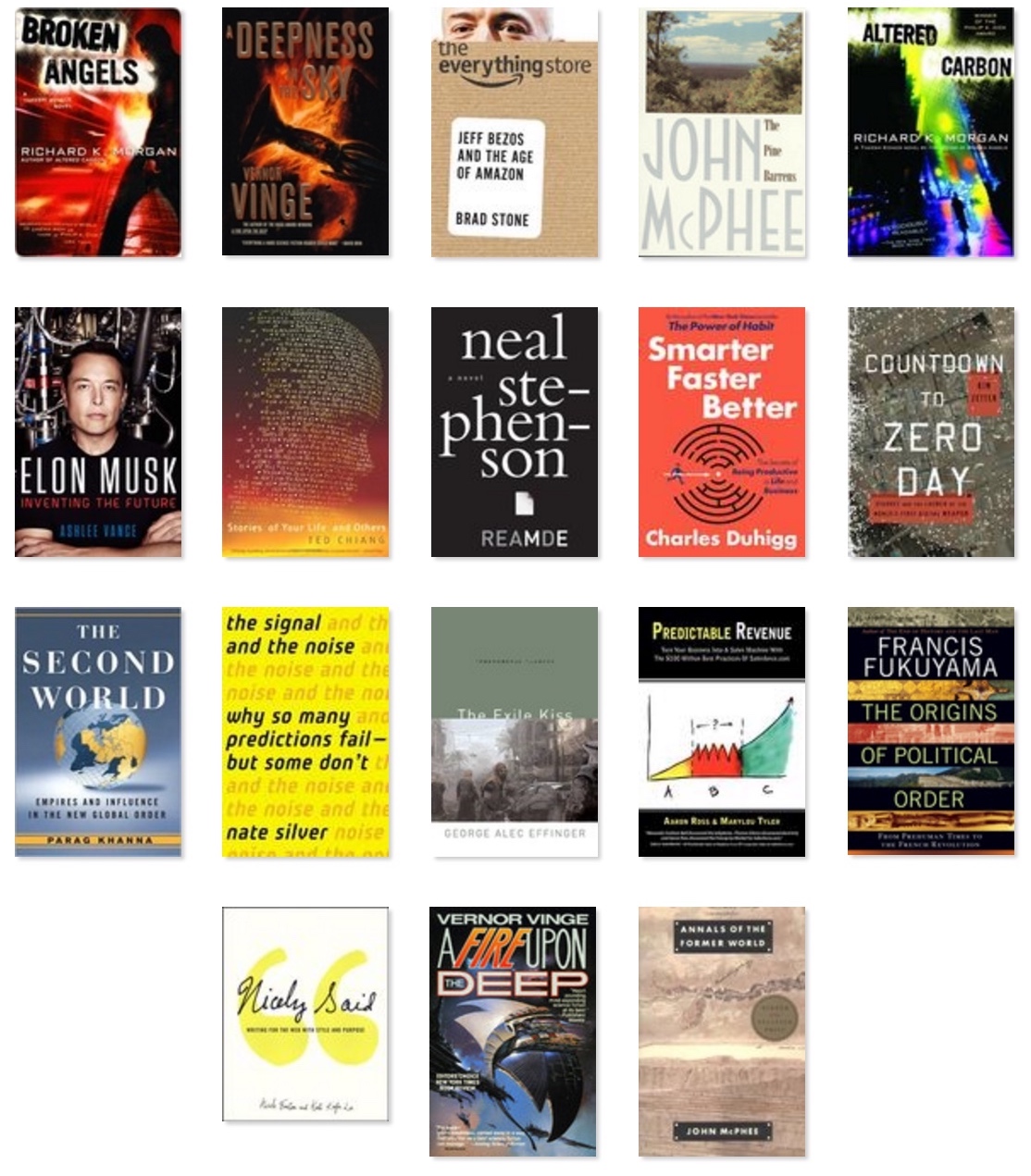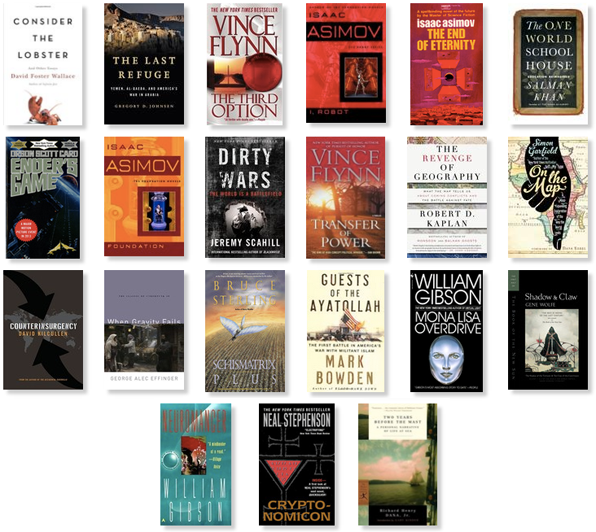I’ve gotten a lot more selective about books to read in the past few years. My 2020 reading goal was 30 books, giving me space to absorb them and take better notes, and to permit reading longer stuff I could take my time with.
Here’s my list for the year, with stars next to the favorites.
 Brave New World by Aldous Huxley Published: 1932 • Completed: January 7, 2020 • 📚 View in Library
Brave New World by Aldous Huxley Published: 1932 • Completed: January 7, 2020 • 📚 View in Library - Shelves: classics, science...
✦
March 17, 2020 • #
Physicians hang diplomas in their waiting rooms. Some fishermen mount their biggest catch. Downstairs in Westborough, it was pictures of computers.
Over the course of a few decades dating beginning in the mid-40s, computing moved from room-sized mainframes with teletype interfaces to connected panes of glass in our pockets. At breakneck speed, we went from the computer being a massively expensive, extremely specialized tool to a ubiquitous part of daily life.

During the 1950s — the days of Claude Shannon, John von Neumann, and MIT’s Lincoln Lab — a “computer”...
✦
December 22, 2019 • #
This one is part book review and part reflection on some personal experience, a chance to write about some science related to a harrowing past experience.
A couple of years ago I had a run in with genetics-gone-wrong, a life-altering encounter with cancer that would’ve gone much differently if I was older or had the run-in in the wrong decade. The short version of that story (which I still plan on writing more about one day on this blog) is that I made it through the gauntlet. A stage IV diagnosis, 6 months of chemotherapy, and 2 major surgeries, and...
✦
December 2, 2019 • #
It’s been a while since I wrote a book review here, and a couple months since I read any fiction. A few of Graham Greene’s works have been on my shelf for years, so I decided to pick up his 1955 novel The Quiet American to give it a go.
(Note: spoilers here, if you care about that sort of thing for a 60 year old novel)
Given that this book was written in the mid-fifties by an English writer, it surprisingly and presciently foresees the quagmire of Vietnam and the naive interventionist...
✦
October 19, 2019 • #
Some top-notch baseball geekery, with Jason Snell comparing the graphics overlays from Fox, MLB Network, and ESPN’s telecasts. I’ve thought about this, too, but have to give it to the ESPN one, with Fox right up there.
Scott Alexander’s review is an excellent in-depth look at this book on meditation. I’m still making my way through it, but it’s definitely a fantastic soup-to-nuts guide so far.
...
✦
August 5, 2019 • #
Andy Grove is widely respected as an authority figure on business management. Best known for his work at Intel during the 1980s, his book High Output Management is regularly cited as one of the best in the genre of business books. After having it on my list for years and finally reading it earlier this year, I’d wholeheartedly agree. It’s the best book out there about business planning, management, and efficiency, still just as pertinent today as it was when it was first published in 1983.
Its relevance more than 30 years later attests to the...
✦
July 23, 2019 • #
Wearables have become such a big market these days that there’s a wide variety of options to pick from if you want to monitor activity metrics. From the basic Fitbit step counters to more ruggedized outdoor watches to full-blown smartwatches, there’s a device for everyone.
I’ve been a devoted user of Garmin’s activity tracking watches for years now, starting out with the Forerunner 220. A couple of years ago I upgraded to the fēnix 5 model, one of their highest-end watches.

I used the 220 model...
✦
June 18, 2019 • #
Geoffrey Moore’s Crossing the Chasm is part of the tech company canon. It’s been sitting on my shelf for years unread, but I’ve known the general nature of the problem it illuminates for years. We’ve even experienced some of its highlighted phenomena first hand in our own product development efforts in bringing Geodexy, allinspections, and Fulcrum to market.
Moore’s “Technology Adoption Life Cycle” is the axis of the book:

In principle, the advice laid out rings very logical,...
✦
April 7, 2019 • #
The linguist John McWhorter has written a plethora of books on the English language. For an academic (he’s a professor at Columbia University), he has a very progressive view of English’s evolution, a supporter of the vernacular and everyday grammar with all its quickly-developing trendy figures of speech over the conservative, traditionalist approaches of Strunk and White. Many linguists of tend toward preservation, pushing standardization of grammar and even teaching “proper” usage that no modern speaker would say out loud. But McWhorter has a different perspective and supports change in usage with...
✦
March 11, 2019 • #
The short story is the perfect format for science fiction. A genre that’s keen on high concepts that can be very interesting often finds itself overreaching when certain concepts can’t sustain themselves through a 400 page full-length novel.
Bruce Sterling, one of my personal favorite authors, thinkers, and self-described “futurist” is one of the best in the business with the format. Globalhead is one of these collections from the early 90s, an eclectic mix of stories of varied genres — speculative fiction, post-apocalyptic, cyberpunk, crime thriller, Victorian steampunk — I begin to wonder if there’s a subject Sterling hasn’t...
✦
February 10, 2019 • #
Since The Origin of Species, Darwin’s theory of natural selection has been the foundation of our thinking about the evolution of life. Along the way there have been challengers to the broadness of that theory, and David Quammen’s The Tangled Tree brings together three core “modern” concepts that are beginning to take hold, providing a deeper understanding how lifeforms evolve.
The book mostly follows the research of the late Carl Woese, a microbiologist who spent his career studying microorganisms, looking for connections between creatures in the micro and macro. Beginning with Darwin’s tree...
✦
January 31, 2019 • #
As I’ve been trying to bootstrap into a meditation practice, most of my learnings have been from various podcast episode discussions and a couple of books on the topic. My approach thus far hasn’t been to try and dig in way deep, but largely to kickstart a regular routine to form a healthy habit.
Since I already listen to Sam Harris’s podcast, I’d heard good things about his book Waking Up as a nice primer on meditation from a secular perspective — a neuroscientist’s view on the subject as a true contributor to...
✦
January 16, 2019 • #
The nearly 2000 year old Meditations by Marcus Aurelius is likely the first ever entry in the “self help” publishing genre. During his last days as Roman Emperor, reigning from 161-180 AD, he wrote the 12 “books” that comprise the Meditations. It’s a personal journal he wrote to himself, never intended for publication, with thoughts, ruminations, reminders, and short stories from his life, all with the objective of serving his future self as a reminder of how to live and act.
There’s not much of a thematic arc from book to book — each numbered paragraph entry largely...
✦
December 30, 2018 • #
My wrap up of books of 2018, continued from part 1.
I don’t remember where I ran across Rovelli first; it may have been a YouTube video of one of his lectures that I found intriguing. Both of them I found supremely enjoyable — popular physics done succinctly, vividly, and in a lyrical style that’s completely unique. The Order of Time is about human perception and asks the...
✦
December 28, 2018 • #
This year was a productive one for reading. Even with all going on in life, I still managed to get through 43 books in 2018. Reading by quantity isn’t the measure of success, of course. I want my selection guided by interest, important, and impact, not sheer numbers. When I scroll back through the timeline, I can see my interests shifting around — from nonfiction to fiction and back, moving between politics, economics, and science.
Rather than run through an exhaustive review of everything I read this year, I’ll give the highlights of my...
✦
December 19, 2018 • #
Borders in today’s world are remarkably static, ever-present lines we all get used to separating territories as if there are hard barriers to interaction between the multicolored countries of your average political map of the world. Centuries of perpetual war, invasions, treaties, intermarrying monarchs, imperialism, and revolutions redrew the global map with regularity, but today we don’t see this level of volatility. When a new country is formed, a disputed territory shifts, or a country is renamed, it makes global headlines. It’s only every few years that you see territorial shifts.
This level of...
✦
December 2, 2018 • #
It’s quite a daunting task to explain anything in theoretical physics in 250 pages, but this is just what I like about Carlo Rovelli’s books. Earlier this year I read The Order of Time, and like that book, Reality is Not What it Seems gets right to the point. No time is wasted or point too embellished.
This time around Rovelli tackles his specialty: quantum gravity. While it is a work of popular science, he does an admirable job of explaining wildly complex theories — made all the more difficult because a...
✦
November 28, 2018 • #
This is the first book review post since I put up my library section. I hope to do more of this in the future with each new book I add to the collection. Enjoy.
The Story of Maps took me a while to get through, but it’s the most comprehensive history I’ve seen on the history of geography and cartography.
Of particular note was the history of the figures in antiquity, their discoveries, and the techniques they used to advance the science of mapmaking. From Strabo, Eratosthenes, and Ptolemy to Ortelius, Mercator, and Huygens, Brown is extremely...
✦
January 18, 2017 • #
I haven’t done a book roundup in a couple of years. This year was more fiction than non-fiction, and my near-term list will probably continue that trend.

Top of the list for sure was this epic work from John McPhee. I wrote about this one in detail earlier this year. It’s a natural history of North America, told in 4 parts as McPhee travels with renowned geologists across the continent along I-80. Each part features a distinct aspect of geology — the...
✦
March 15, 2016 • #

I majored in geography in college and always liked earth sciences. I dabbled a bit with classes that were related, but not core to geography study — your basic geology courses and a class in geodesy. One of the classes I took called “Geology of the National Parks” had an applied approach to explaining the foundations of geology. Something about hopping from Katmai to Yosemite to the Everglades made me see geology as more than rocks and minerals. I loved the massive scope and scale of the Earth’s 4.5 billion years. Normally anything...
✦
July 17, 2015 • #
I’m a baseball fan from way back, and grew up as a Braves fan during the early years of their 1990s NL East dominance. As much as I always enjoyed following the sport as a casual fan, I’d never studied the game much, nor its history beyond the bits that are conventional knowledge to anyone with an interest in the sport (the seminal records, player achievements, and legends of the game). I’ve been on a kick lately of reading about sports I enjoy—baseball and soccer—and have picked up a few books on the subjects to find out what I’ve been...
✦
December 21, 2013 • #
2013 was busy in so many ways. Our product matured beyond the level I’d hoped it could, we’ve done some incredible mapping work around the world, and I’m just getting started with my involvement in an awesome local hackerspace scene. Even with all that going on, I still managed to read a fair number of great books this year.

A few thoughts on some of the favorites:
Neuromancer, William Gibson. 1984.
I first read this one back in 2010, but after recently finishing up the Sprawl series...
✦
October 30, 2013 • #
This is part one of a series of essays on Isaac Asimov’s famous Greater Foundation story collection. In this first one I discuss the time travel mystery The End of Eternity.
The prolific science fiction writer Isaac Asimov published an astonishing body of work in his life. Though he’s probably most well-known for his stories, collections, and postulations about robots (and, therefore, artificial intelligence), he wrote a baffling amount speculating on much bigger ideas like politics, religion, and philosophy. The Robot series is one angle on a bigger picture....
✦
July 9, 2012 • #
I recently finished reading Spycraft, Robert Wallace and Keith Melton’s chronicle of the CIA’s spy tech divisions, specifically OTS (Office of Technical Services), the division responsible for creating technical espionage gear. Things like eavesdropping devices, dead drop containers, secret writing, disguises, and document forgery.

The story of OTS is fascinating and full of all sorts of straight-out-of-the-movies espionage games and tactics. The book is chock full of anecdotes of crazy operations from the group’s inception with OSS during World War II, through the years of the Cold War. For evidence, look no...
✦







